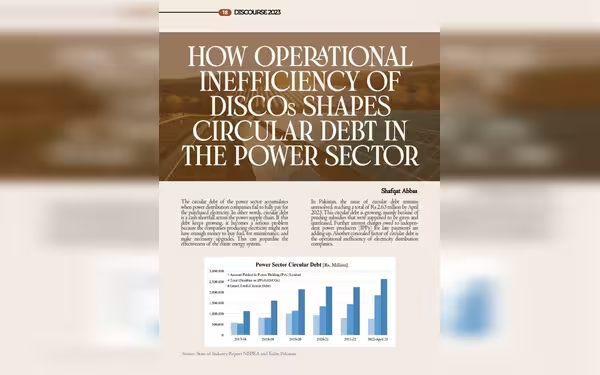Thursday, July 4, 2024 05:52 PM
DISCOs in Pakistan Face Rising Debt Crisis
- DISCOs' losses and under-recoveries increased by 25%.
- Circular debt in the power sector reached Rs2.635 trillion.
- Anti-theft campaign impacted DISCOs' financial performance negatively.
 Image Credits: Pakistan Institute of Development Economics
Image Credits: Pakistan Institute of Development EconomicsThe rising losses and under-recoveries of DISCOs in Pakistan have led to a significant increase in circular debt in the power sector, reaching Rs2.635 trillion. Despite efforts to combat electricity theft, financial challenges persist, highlighting the urgent need for comprehensive reforms.
In the first seven months of fiscal year 2023-24, the losses and under-recoveries of Distribution Companies (DISCOs) in Pakistan increased by 25% under the caretaker regime compared to the previous fiscal year. This led to a rise in the circular debt in the power sector, reaching Rs2.635 trillion. Despite a slight slowdown in the growth rate, the total debt continued to climb from Rs2.626 trillion to Rs2.635 trillion. The main culprits behind this debt include payments to Independent Power Producers (IPPs), allocations to Pakistan LNG Limited (PHL), and payments to government-owned power generation companies (GENCOs) for fuel supplies.
Payments to IPPs totaled Rs1760 billion in the first seven months of FY 2024, showing a decrease of Rs8 billion from the previous year. On the other hand, GENCOS' payments to fuel suppliers rose to Rs111 billion, while the allocation to PHL remained constant. DISCOs' losses and inefficiencies surged to Rs86 billion, with under-recoveries hitting Rs198 billion during the same period.
During the caretaker government's tenure, an anti-theft campaign was launched to combat electricity theft. However, this campaign negatively impacted the financial performance of DISCOs. By January 2024, receivables from K-Electric amounted to Rs356.9 billion.
The increase in circular debt and losses in Pakistan's power sector highlight the urgent need for comprehensive reforms to address inefficiencies, reduce losses, and improve financial management. Sustainable solutions are required to ensure the stability and viability of the power sector in the long run.













